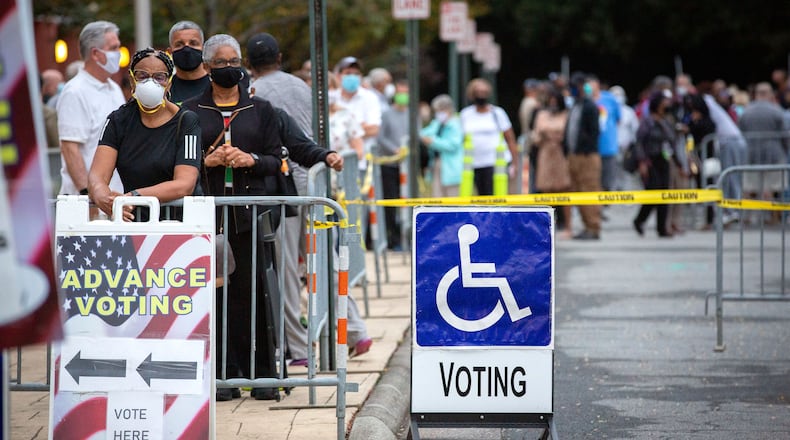A federal judge dismissed a lawsuit Tuesday over long lines at the polls in Georgia, deciding that election officials — not courts — are responsible for voting equipment, training and backup plans.
U.S. District Judge Michael Brown said he disagreed with the plaintiffs’ contention that lines are “all but certain” to occur Nov. 3 after election officials made improvements since Georgia’s primary election.
Brown wrote that election officials have recruited more poll workers, added tech support staff, increased voting locations and improved absentee voting options.
Brown’s decision came the day after voters in many areas waited in lines for hours during the start of three weeks of early voting. High turnout and technical difficulties contributed to the lines.
“The evidence shows defendants have taken extensive measures to address the issues that caused long lines in the past,” Brown wrote in a 78-page order. “It is possible, of course, these measures will ultimately prove insufficient and long lines will still arise. But that is not the point; no one, including this court, can guarantee short lines.”
The lawsuit, filed by the Democratic Party and three voters, followed a primary marred by coronavirus-related precinct closures, social-distancing requirements and difficulties operating voting machines.
About 11% of voting sites in Georgia closed over an hour late, with Black voters more often affected, according to a July analysis of elections data by The Atlanta Journal-Constitution. About 61% of majority-Black precincts closed on time, compared with 80% of mostly white precincts.
The plaintiffs wanted Brown to reallocate voting computers, order the use of paper ballots when lines exceed 30 minutes, increase poll worker training and require more rigorous equipment testing.
Brown criticized an analysis by an operations and supply chain management professor, casting doubt on assumptions about how turnout and voting equipment could lead to voting delays.
“The court cannot strip state officials of their constitutionally enshrined authority over elections and reassign that authority to an academic instead (at least on the facts here),” Brown wrote.
The professor, Muer Yang of the University of St. Thomas in St. Paul, Minnesota, had concluded that some polling places were likely to experience long lines.
“Although counties have made efforts to improve the voting equipment allocation for the 2020 Presidential Election, many polling places are identified to be likely to have long voting lines,” Yang wrote.
With the case’s dismissal, there are no remaining motions seeking emergency court action related to Georgia’s elections in federal court.
A federal judge previously denied efforts to replace Georgia’s touchscreen voting system and order more emergency paper ballots in polling places. An appeals court recently restored a requirement for all absentee ballots to be received at county election offices by 7 p.m. Nov. 3.
But a judge granted relief in one case requiring updated paper backups of voter registration lists and absentee ballot information at voting locations.
About the Author
Keep Reading
The Latest
Featured




